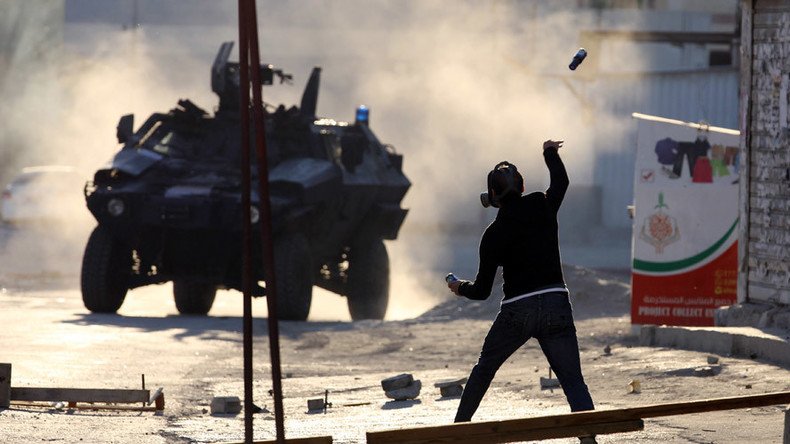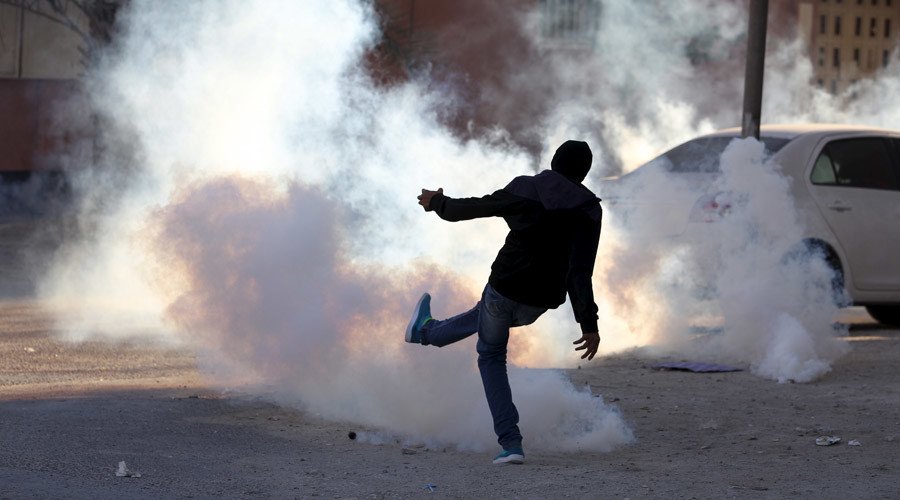Police clash with protesters in Bahrain: Tear gas, Molotov cocktails and stones (VIDEO)

Hundreds of anti-government protesters clashed with tear-gas firing police in Bahrain over the weekend in demonstrations marking the fifth anniversary of a violently suppressed uprising in 2011 that had sought political change in the Sunni Arab country.
Activists from the Sitra community, located south of Manama, Bahrain’s capital, attempted to march towards a local highway on Sunday, but were stopped by police firing tear gas, AP reported.
RT’s Ruptly agency posted footage from Bahrain showing the intense clashes.
The protesters are seen throwing stones and Molotov cocktails at armed military vehicles, while Bahraini security forces respond with teargas. Heavy smoke and fires are seen on the streets, as protests are heard shouting.
The demonstrations were organized by Shia and pro-democratic forces throughout the island kingdom as part of a day of “civil disobedience against the regime.” This is only the latest such protest in Bahrain, where the Shiite-majority population is ruled by a Sunni royal family.
Protesters carried flags, portraits of imprisoned opposition figures, and posters of Manama’s Pearl roundabout, the center of the failed 2011 uprising, which has since been demolished.
Bahrain sexually abuses detainees, still ‘capital of torture’ despite UK support – HRW https://t.co/nZ7hCY6viwpic.twitter.com/om2m1o9SxH
— RT (@RT_com) November 23, 2015
The Bahraini demonstrations of 2011, in which protesters called on King Hamad bin Isa Al Khalifa to grant them more political rights, were some of the biggest to hit the Gulf Arab states during the Arab Spring.
The government said in a statement on Sunday that it “remains fully committed to delivering sustainable progress, through stable and meaningful democratic development” and warned against “groupings seeking to reject all attempts at political advance in favor of narrow, short-term interests.”
Some of Sunday’s protesters tried to block roads and threw petrol and paint bombs at police.
Clashes were also reported in the village of Nuwaidrat close to Sitra.

A day earlier on Saturday, a number of minors were arrested. A statement from Bahrain’s Interior Ministry cited by AP claims they had been “manipulated into participating in riots and acts of vandalism.” After questioning, they allegedly admitted to committing violent acts, including attacking police vehicles, arson, and blocking roads.
Last week, Amnesty International called for progress on the human rights front in Bahrain. Their report from last year claimed that the government had failed to end human rights violations since the 2011 uprising.
In addition, Human Rights Watch (HRW) warned in January that credible allegations of abuse and torture of detainees undercuts claims that Bahrain’s criminal justice system is improving, calling the Gulf state’s new institutions “sham reforms.”
READ MORE: ‘Sham reforms’: UK-funded watchdog in Bahrain fails to investigate torture allegations
Having witnessed several waves of mass protests since the beginning of the Arab Spring, the Bahraini monarchy has been defiant and brutal in response to calls for reform, with dozens killed and more than 3,000 injured in a February 2011 military crackdown. Bahrain is supported by other Gulf monarchies, as well as by the US, which has its 5th Fleet stationed in the Persian Gulf state.












